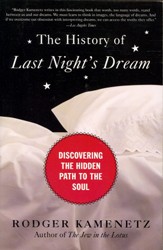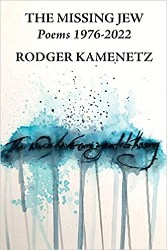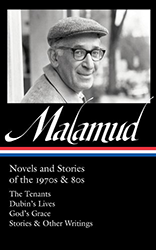Stopping short of creating an imaginary conversation between two great Jewish writers, Rodger Kamenetz provides the groundwork for such an exchange in this highly original study — a meditation, really — on the inner circumstances that link them. Kamenetz reads the works of each man “as autobiography of the soul,” the soul of an ardent seeker. Each mastered and contributed to the art of the literary spiritual parable. Their narratives involve quests, often frustrated ones, as do their lives. Each man wished many of his writings to be burned after his death. Kamenetz explores their individual motives, setting these against the Nazi conflagrations of Jewish books.
A third seeker, Kamenetz himself, weaves his meditation around his journey to Uman, the Ukrainian town of Rabbi Nachman’s later years and burial, to participate in the annual Rosh Hashanah service that brings Jews of many stripes together. Kamenetz had already made many visits to Kafka’s Prague to teach Kafka’s writings.
Kamenetz examines the lives and writing of Kafka and Nachman in such a way that each illuminates the other. Beginning with unexpected and intriguing similarities, Kamenetz moves from comparison to contrast and back again, in several cycles, finally putting into focus the unique qualities of each of his subjects, and something of his own unique qualities as well.
Burnt Books is a fascinating and intellectually challenging journey of heart and mind. Bibliography, notes.
Interview
Born in 1950 in Baltimore, Rodger Kamenetz received a B.A. from Yale and M.A. degrees from both Stanford and Johns Hopkins. After 28 years of teaching at Louisiana State University, where he was the founder and first director of two important programs — Creative Writing and Jewish Studies— Kamenetz recently retired from his position as Distinguished Professor of English and Religious Studies. Professor emeritus Kamenetz works as a dream therapist and continues his adventurous writing.
Among his many publications is Stalking Elijah: Adventures with Today’s Mystical Masters, which won a National Jewish Book Award for Jewish Thought.
Philip K. Jason: In your new book, Burnt Books, you explore Rabbi Nachman’s understanding “that this father-son conflict is an old Jewish business.” Below the surface of the conflict between Kafka and his father, lie the many conflicts of father figures (often kings) and sons figures in the writing of both Nachman and Kafka. Your journey to a kind of Kamenetz fatherland, and the few direct references to your own father, is a processing of that conflict. This is explicit in your dreamwork discussion on the YouTube video “Dreams of My Father.” On one level, Burnt Books is about fathers and sons.
Rodger Kamenetz: Yes, definitely. The History of Last Night’s Dream goes into great depth about my father and me so the subject was already on my mind. My father died while we were homeless during Hurricane Katrina. Kafka’s troubles with his father were definitely a key point of identification. And Nachman’s loss of an infant son, since I also experienced that. But these sorts of personal connections are not front and center in Burnt Books.
PKJ: Where did you get the idea of holding Kafka and Nachman in near-dialogue with one another?
RK: I had been thinking about it for many years, since I taught Kafka in Prague in a Charles University building overlooking the old Jewish cemetery. There are lots of Jewish ghosts in Prague. I’ve always loved Nachman’s tale, “The Humble King,” because we are ourselves searching for some image of God — this is also what I do with dream work, help people see the images of God they already carry. And I’d noticed that “The Humble King” in condensed form had much the same plot as Kafka’s The Trial. Namely, a corrupt court system seemingly run without knowledge of the higher authorities. Both stories are midrashim on the Book of Job. So it all was working together. They were already talking to each other through their stories and in my mind. But after Katrina, living through the complete destruction of a city, I understood how our big story — the Torah — is always re-circling. I saw a city return to the opening chapters of Genesis. I remember that first Rosh Hashanah seeing three heron flying overhead. Our city street was going back to nature, becoming a flyway. And so I began thinking about home and what home means, and what it’s like to lose your home. Part of me is like Kafka, always daydreaming about leaving home but never leaving. The other part of me is like Nachman, always leaving home, setting off on new adventures.
PKJ: What brought you to studying Rabbi Nachman’s life and writings?
RK: I am fascinated by the boundary between literature and kabbalah,between literature and religion. Rabbi Nachman stands at that boundary (as does Kafka). Rabbi Nachman is a kabbalist writing fairy tales and Kafka is writing fables that are our modern day kabbalah. But a more important reason is what one of the people I met on the way to Ukraine told me: Rabbi Nachman is the rebbe for our time. He still lives — through his stories, his teachings. His teachings respond to the urgent questions of faith and hope, the questions Kafka asked more piercingly than anyone. You see I can’t talk about Rabbi Nachman without talking about Kafka and vice versa.
Philip K. Jason is professor emeritus of English at the United States Naval Academy. A former editor of Poet Lore, he is the author or editor of twenty books, including Acts and Shadows: The Vietnam War in American Literary Culture and Don’t Wave Goodbye: The Children’s Flight from Nazi Persecution to American Freedom.





